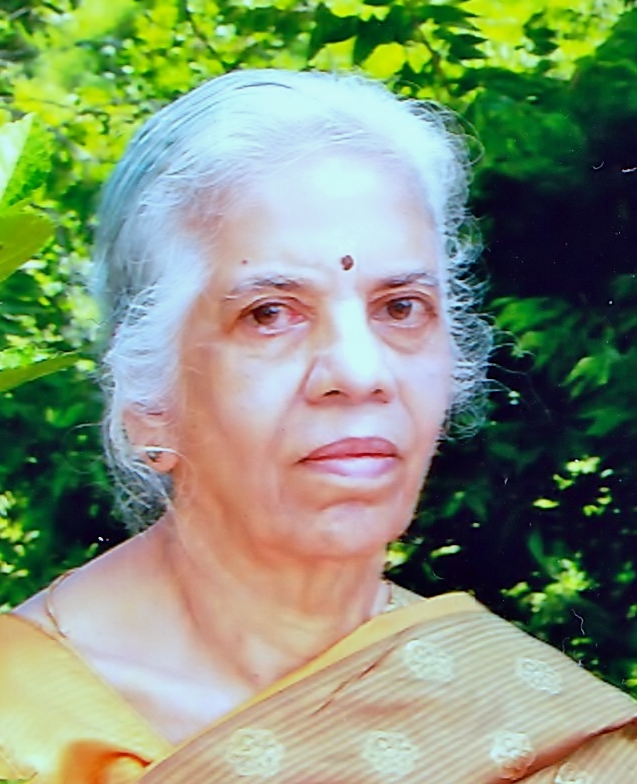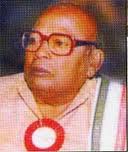The Telugu word for letter [alphabet] is akshamam. The literal meaning is “that which stays forever”.
Due to frequent transfers in my father’s job, I could not finish high school the first time. I passed the mid-year exam and waited the next six months to attend college the following year. During that interim period, I had gotten used to shadowing my mother and learned plenty in the process—more than any education I had received in my school.
Among the lessons I had learned, the most important ones came from Sandraalu, the vegetable vendor, who used to come to our door every day with a basket filled with vegetables picked fresh from her garden in the backyard. She would bring glistening eggplants, tender okra, and the squash which she would not let me touch. She would say that Brahmin women would not buy them if they see nail marks on it.
Sandraalu had a way with words. She was great in telling about the events in her life like an accomplished narrator. Her stories are imprinted on my mind forever, more than any stories I have ever heard anywhere else.
Sandraalu would start with a trite phrase like “nothing stays forever” and then go into a sweeping narration of how she had trusted a Christian father, converted to Christianity, realized that the change had not been for the better, returned home, got an earful from her mother-in-law, hopped on a bus and ended in a neighboring village, Simhachalam. In Simhachalam, she had met with Jigini Saibu who was running a small tea stall at the bus stop on the outskirts of the village. He listened to Sandraalu’s story and invited her into his home.
He said, “You cook for me and I will provide a roof over your head.”
I do not know how many times I have heard this story. Each time it sounded afresh for me. I had never been tired of her stories.
One day, I asked her, “How come you are selling vegetable and not fish?” That is because she had told me earlier that she was a fisherwoman by birth.
As usual, she went into a spirited narration, swaying like a vine on a windy day. That is how I had learned about her stormy life.
On another day, she said, “That is the thing ma’am. Wretched times, wretched thoughts—follow on the heels of each other. My man and I had a great life, like royalty, from the sales of the fish my man had caught. I brought four kids into this world. Then, that white man came to our village and talked his head off; chewed us up. He said, ‘These high and mighty folks are not treating you well. Are you not people like them? Prick them and they also bleed just like you do, right? Not milk or honey? They don’t let you enter their homes, why? I’m telling you. You come with us. We will give you food, clothes, and let you sit with us in our living rooms.’ He mouthed big talk and I got carried away. At first, my husband was okay with it but then changed his mind. He said he would not go. My mother-in-law said, ‘You can go but cannot take the kids.” I went all right … but what did I gain? Nothing. I ended up doing the same thing at his house as had been doing before. One rock is as good as another to knock off one’s teeth.”
I understood Sandraalu’s words, partly though. The rest was Greek to me. All the same, I was fascinated by her eloquence. I wanted to ask her, “Tell me, what school you had been to? I want to go to the same school.”
She continued, “Listen to me, I am telling you. You were born to that nice lady, right? She is goddess Lakshmi herself. Can you switch her for another woman? No. Nobody can replace your mother. You can not. That is the way with religion too. You were born into one religion, you grew up with it, and you stay with it. What is the point of running after things? Nothing. We should learn to find happiness in what we have. That is the real wisdom. You are going to college and getting big education. After that, you’ll go away on an airplane to another country, looking for morsel of food.”
I was amused but the words that I “would go away looking for a morsel of food” pricked at my heart.
“How do you know?” I asked her.
“I know all these things, little ma’am. After I am done with this basket, I wait at the bus stop round the corner. There, people talk all these things. It is like All India Radio, you know,” she said with a piquant smile.
Sandraalu was the mother of four kids. One day I asked her why she did not sent them to school.
“What do we need all that schooling for, madam? Labor is our life. If we don’t put in our day’s work, we can not eat. Unless we eat, we can not work. I earn four rupees a day and the kids bring a rupee each; then we have eight rupees in all. That gets us through the day. For us, the kids are the assets, madam,” she said.
I shut up. I did not have the heart to tell her that education is important and that a person without education is nothing. She is telling me survival comes first. You can accomplish anything only after finding food to live.
***
Sandraalu had come to her senses. She understood that switching religion did not bring her prosperity. She returned to her husband and the family but it was too late. Her husband had already found another woman and settled down.
Sandraalu, in despair, jumped on the first bus and arrived in Simhachalam town. She ran into Jigini Sayibu, a tea-stall owner, running his stall next to the bus stand. He suggested, “You cook food for me, I provide a roof over your head.” Sandraalu said fine.
Sandraalu could not sit in the hut all day doing nothing. She was not that kind of woman. She decided to plant a vegetable garden and start her own business. Everyday, early in the morning she would pick fresh vegetables and go door to door in the neighboring city and earn a little money of her own.
One day, I asked her, “You say life goes on, and nothing stays forever. You believe that, why aren’t you staying home? Why bother to grow vegetables, take the bus to the city … all that hassle? What is the point?”
I asked because she had said her earlier that Jigini sayibu had asked her the same question. It seems he said to her, “My income from the tea-stall is plenty for both of us. Why sell vegetables?”
In response to my question, she said, “Madam, we are human, right? What did the God Almighty say? He said, ‘you do your duty and I will do mine.’ What does that mean? As a human being, you have a dharma. You do what you need to do. Don’t ask what is this or that. No point in hair-splitting legalities.” She went on for the next fifteen minutes lecturing about the legalities in real life situations. Something in her manner rendered me speechless.
000
Nearly one half of a century passed by yet the words of Sandraalu stayed on my mind as if they were etched in stone, as if I heard them just yesterday or the day before.
I live in America now. I sat in my office and was watching through the window the discolored sky like washed out dhoti, the Maple trees in skeletal state, more like the sages smeared with ashes, standing on one leg and meditating—the entire atmosphere seemed to hold mirror to time, something like a work in progress.
My brain became numb for no reason. At this time I should be on my couch, curled up and sipping hot coffee or much spicy pakora, and dissolve into the far-off space.
Suddenly, out of nowhere, Sandraalu came to mind.
Thirty years have passed by since I arrived in America. In the past twenty years, I had been through seven computers in a crazy attempt to keep up with the fast changing technology; I had been through all the stuff from 5¼ floppy disks to the ini cds, which would fit snugly in my palm; switched from desktop to laptop, not to the blackberry though. Not yet anyways. I feel like a beat up ferryboat caught in violent floods, I was stuck on idea of using the “new and improved” versions that mushroom the market endlessly. I have to follow them like the groom who repeats the marital vows mindlessly after the priest in the traditional wedding ceremony.
I have changed the Telugu fonts five times to date. I have to follow the dictates of technology for the fear of facing the music of disrepair. All my writings would be lost to the posterity and that scares me. I can not let that happen.
In truth, all this philosophical self-examination originated from the aggravation caused by my boss. Here is what had happened a year ago.
A Telugu-educated American professor decided to start a company for digitalizing the books in Indian languages. He offered to digitalize the books published in Indian languages, reformat them attractively, and save them for future generations for a fee. He suggested that he would take care of the marketing, if I agree to do the work as stated above. I know mine is not a marketing brain. Therefore, I accepted his proposition.
I was not sure why Telugu people could not have this work done at home. After all, most of the software engineers are from Andhra Pradesh. Although I agreed to his proposal tentatively, I was not sure that we would get any business for the same reason, that most of the software engineers are in India and thus it would make sense for them to undertake the project themselves. I was wrong. I do not know how but my boss succeeded in receiving business. To my great surprise, there are people in Andhra Pradsh willing to shell down good money and get the work done in America. Is it the concept of outsourcing that got to them, I do not know. Do they want to be part of this overwhelming globalization? Do they believe the language acquires a new hue in the hands of white folks?
I do not know. It is beyond my wildest imagination but it has happened. We are getting projects for digitalization.
Working on the actual project is a different story. I was shocked by the language in the book I was expected to digitalize. To illustrate this part in English is a task in itself. The vocabulary, the grammar and the sentence construction are horrible. I am lost; no way I can describe the spelling in English for your comprehension. I can not imagine any Telugu man or woman speaking like that, much less writing. From what planet this man or woman has come?
I explained the problems with the text to my boss. “Can we send the book back and ask them to revise and send the correct version?” I asked him politely.
My boss stared at me; he was polite. He leaned forward, put his palms on my desk and said, speaking softly, “Our job is digitalizing whatever we have received. It is not our place to correct their language and grammar.”
I know I am not supposed to correct them but there are places where any person with any respect for language cannot tolerate. And also places where I would have to make judgment call, which possibly is not fair, given the circumstances.
My boss looked at me as if he was pondering over and then said, “All right. I will contact them. In the meantime, you continue your work the best you can.”
“All right,” I nodded. Maybe I offended him by pointing out the mistakes. Maybe he was offended because I was the one that found them.
He added, “Our job is to digitalize whatever we are given, not correcting them.”
My spirits start drooping. Reaching out for a panacea, I start surfing Telugu web sites.
The computer era is permanent, is here to stay. I make no mistake in that regard, no illusions. However, there is a lot that is not permanent within the field of computers.
Suddenly a huge wave of depression surged in my heart. Half of the Telugu bloggers are software engineers. They are busy creating new programs and creating new programs to improve the hardware.
I am also part of that consumerism that is eating us away—constantly upgrading and updating the software and the hardware in my computer. I have run through the storage gadgets from 5½ floppies to palm-sized mini CDs and backup drives. I have upgraded my computer one after another from 80 processors to Pentium IV. The Telugu fonts I had started went out of date long time ago. The time I had spent digitalizing my stories had been wasted for all practical purposes. How many times can I key in my stories? Even PDF files I had created at the time, some of them at least, are not readable on some of the computers anymore.
Samdraalu’s words are ringing in my ears like the bells in the Rama temple. “Nothing stays forever,” she said with conviction. After all these years, it seemed to make sense for me, finally.
I opened the book I was supposed to digitalize and started typing away vigorously.
(End)
The Telugu original, aksharam paramam padam, by Nidadavolu Malathi has been published on eemaata.com, and later on tetulika.wordpress.com. The translation has been published on thulika.net, December 2008.








